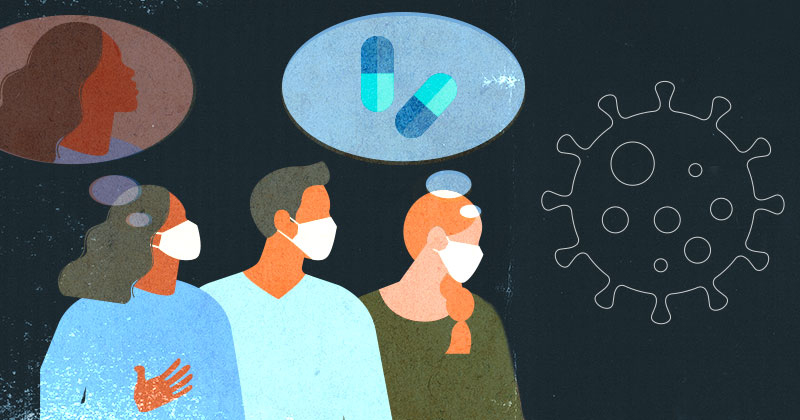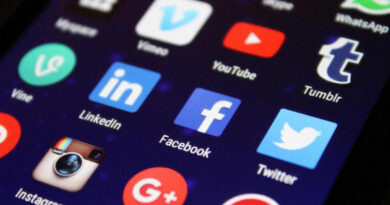COVID-19 conspiracy theories | UDaily

Illustration by Jeffrey C. Chase April 28, 2020
Prof. Joanne Miller discusses the danger of spreading rumors and machinations about the virus
Conspiracy theories have been the gasoline on the fire that has sparked resistance to coronavirus (COVID-19) social distancing guidelines and doubts over the danger of the disease.
That resistance escalated into anti-social distancing protests in several states.
Conspiracy theory expert Joanne Miller, University of Delaware associate professor of political science and international relations, answered a few questions about the danger and psychology at work behind these beliefs regarding the coronavirus. The conversation has been edited for brevity and clarity.
Q: Why is COVID-19 a prime target for conspiracy theories?
Miller: People tend to believe conspiracy theories because they help them cope with uncomfortable feelings and events in their lives, and they protect our worldviews or our beliefs. When it comes to COVID-19, a lot of us are feeling a loss of control. And in the political arena, the beliefs that we tend to want to protect are beliefs about our partisanship or our ideology. We call this motivated reasoning. When it comes to something like coronavirus it’s kind of the perfect storm of both of these needs.
We see conspiracy theories, for example, that 5G technology is spreading the virus. In the United Kingdom, some people have actually set fire to 5G towers. Believing the 5G conspiracy theory gives us some control because it gives us something to fight. And that’s a sense of control that we can gain back. We can’t fight the virus itself, but if we can find the thing that we think is causing the virus that helps to regain some control.
Q: What is the potential danger in conspiracy theories, especially when it comes to something like COVID-19?
Miller: It seems like this would be more dangerous than believing some other more general conspiracy theory. There are two types of dangers related to COVID-19 conspiracy theories. One type involves the things like we’re seeing — setting fire to 5G towers — but the other is a potentially broader concern: The potential for people to resist, as we go forward, either taking antibody tests or resist getting the vaccine when one is created and rolled out.
Q: Who are most likely to believe these theories?
Miller: People who are experiencing a significant degree of loss of control right now, people who have lost their jobs, people who all of a sudden have kids at home and are trying to juggle all sorts of things that they’re not used to juggling. I would predict that anyone who is feeling a heightened sense of lack of control or uncertainty in the face of this global pandemic would be more likely to potentially go to conspiracy theories as a way to sort of regain some of that control.
In addition to uncertainty, there’s also a political aspect to COVID-19 conspiracy theories. In this case, we’ve got a president who’s a Republican, so we might expect that Republicans right now might have a higher need to protect or bolster their worldview that the president is doing a good job of handling the current situation. I know from some data that I’ve collected that Republicans are more likely to believe, for example, that the virus was created as a biological weapon in China. But I want to emphasize that those particular beliefs arise from the fact that there’s a Republican in office who’s being scrutinized with regard to his ability and his effectiveness. If the roles were reversed, and there was a Democrat in the White House, I’d expect that these needs [to gain control and to protect and bolster their worldview] would be more activated for Democrats.
Q: What can we do to combat conspiracy theories, especially those related to COVID-19?
Miller: I don’t have any silver bullets here, and I don’t have much good news about our ability to convince somebody who believes that particular conspiracy theory to change their mind. I might be able to give you a lot of facts that, from my perspective, are incontrovertible proof that 5G technology isn’t spreading this virus. But if that belief helps to make you feel better because it decreases anxiety and decreases loss of control, then you’re going to resist any of that factual information that I have. You may believe me for a little while. And then the minute that your anxiety ramps up again, it will wear off.
We’re all susceptible to these types of beliefs. Instead of trying to convince other people not to believe a particular conspiracy theory, one thing we can all do is to prevent the spread of conspiracy theories by saying to ourselves, oh, there’s this piece of information that says that this virus is caused by “X” thing, and this is the reason that I’m kind of sort of attracted to that explanation right now. It helps me feel better about the political situation, or it helps me reduce anxiety and uncertainty. If so, maybe we should take a pause before we share it with friends and family on social media. Stop and see if other sources that we trust, even maybe sources that we don’t trust, are also talking about that same thing as a potential cause, and really stop and think and remind ourselves that we’re all susceptible to these kinds of beliefs. Check the information checker on motives before we spread information that may be then more widely believed and more widely spread.
*** This article has been archived for your research. The original version from UDaily can be found here ***


